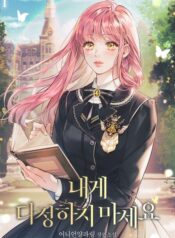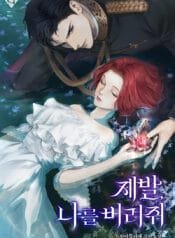“Once this school year ends, you’ll graduate.”
At my words, Edith, who had been staring at the ceiling, turned her head. Her face, tinged with dawn light from beyond the window, looked bluish like something submerged underwater. Her swollen lips moved slightly, resembling a fish mouthing at the water’s surface.
“You’ll come, right? To my graduation. You promised long ago that you would.”
Could I go? I couldn’t give a definite answer.
I knew nothing about the North, and consequently couldn’t predict my future life there. That simple word—”Yes”—was difficult to say.
Slowly, I sat up. Sensing something unusual in me, Edith followed suit. I reached out and opened the second drawer of the bedside table.
It was around this time two years ago that I purchased cufflinks I thought would suit Edith. I kept missing the right moment to give them to her, postponing it until today. Though I hadn’t originally bought them as a graduation gift, they seemed appropriate now.
“What’s this… why did you prepare something in advance?”
“I didn’t prepare it specifically. It wasn’t bought as a graduation gift, but… just in case.”
“No. That’s not right. I won’t accept this. Give it to me properly when I graduate. In person! Don’t forget, okay?”
Looking down at Edith as she nestled against my chest like a child seeking comfort, I reluctantly answered. With my answer came a resolution.
“…Okay.”
No matter what happened, I would come to see Edith’s graduation.
After that, we fell silent as the night deepened—a night when sleep remained elusive.
“Edi.”
Looking down at her blotchy face covered with ointment, I called her again.
“Edith.”
Her deep reddish-brown eyelashes remained motionless and quiet.
I lowered my feet to the floor, slipped them into soft slippers, and wrapped the shawl draped over the chair around my shoulders. Sleep refused to come.
A walk seemed necessary—just a short circuit around my annex. Comforting myself that this might induce sleep, I left the room.
The stars shone brightly overhead, like a black sea of night unfurled above me. Breathing in the faint scent of roses surrounding the annex, I took aimless steps forward. At the end of the corridor appeared a gallery decorated lavishly with flowers and vines for tomorrow’s wedding. Following that gallery straight ahead would lead to the main building of the Veritatis mansion.
The main building where Father and Oscar would now be sleeping.
After staring at that path for a while, I impulsively stepped onto the red carpet. Tomorrow I would walk on this red carpet for the wedding ceremony anyway—treading on it a day early wouldn’t make much difference.
The sky remained dark, the air cool yet tepid, still fragrant with roses.
Suddenly, I longed to see my mother—to see Lady Brandon’s portrait, her only portrait.
* * *
They say daughters follow their mothers’ paths.
My mother, Lady Brandon, also had an arranged marriage with Count Veritatis. Even knowing the Count had a commoner mistress, Madame Poporani, Lady Brandon accepted his proposal.
This was the story Miriam told me one day in my childhood, when I was exhausted from crying and asking why Father didn’t love me.
Miriam was a young maid Lady Brandon had brought with her. After Lady Brandon left the Veritatis estate, Miriam served Madame Poporani before coming to me.
She was the one who told me the unvarnished truth about why I couldn’t be loved—a reality I neither wanted nor could understand as a child.
While Madame Poporani gave me a small, compassionate affection that allowed me to breathe, Miriam taught me how to become an adult faster so I could survive.
The red carpet ended, and the scent of roses faded. I pushed firmly on the entrance door before me. Starlight filtered through the door crack, creating shimmering blue streams across the pale corridor.
Following the light’s guidance and tracing very old memories, I recalled the salon where Lady Brandon’s portrait hung.
I remembered her face, so identical to her portrait.
‘You haven’t opened it yet. Brote, my daughter. Remember this. Every action has its price, and that price is determined not by you, but by fate.’
Her bloodless white face with lips redder than roses moved slightly. Her hair, resembling shadows deeper and darker than those cast on the ground on a sunny day, rippled like waves as she rose.
As if that was all she had to say, I recalled her black back growing distant.
The Lady Brandon in my memory—my mother—was like a dark sea at night whose depths remained unfathomable. Truly, she was someone whose inner thoughts remained impenetrable.
Perhaps that’s why nobody knew what Lady Brandon was thinking or why she accepted the Count’s proposal.
Or maybe nobody cared enough to wonder.
Regardless, my mother, Lady Brandon, married my father, Count Veritatis, and soon after conceived me.
They said it was a long, terribly difficult labor. After that extended suffering, all she gained was a daughter who couldn’t inherit the title and a body that could never bear children again. In a way, it seemed natural that she would resent me.
They say misfortunes come in succession.
The very next year, Madame Poporani also gave birth—to a very healthy boy.
A daughter born to the legal wife and a son born to the mistress. The legal wife could bear no more heirs after her daughter, and the Count desired no more children.
Such is love—something that stands above contracts entangled with money, honor, and other peripheral matters. Thus, the Count paid Lady Brandon an enormous settlement and sent her away from the Count’s household.
Lady Brandon wished to walk alone down the flower-strewn path before her. She was the youngest daughter of the Brandon County family, an imperial scholar, and now one of the wealthiest people in the kingdom. She had no need for “me.” There was no place for “me” in her life.
She left me behind—here in the prosperous southern region of Veritatis, surrounded by flowers, vineyards, rivers, and trading ports.
This was… natural. Before being my mother, she was a woman, a person. There was nothing strange about her prioritizing her own happiness.
I must never resent her.
I placed my hand on the spotlessly clean doorknob. Pushing the well-oiled door open just enough to create a gap, I slipped my body through.
A faint smell of dust greeted me. The room was completely dark except for the dim light filtering through the curtained windows. Nothing obstructed my path. I walked straight ahead, extending my hands forward, waiting to touch the wall.
My fingertips met a cool surface. Taking one step forward, I spread my hand wide to feel the smooth wall. I felt the golden frame with its raised rose patterns filling my palm.
I stood still before it, waiting for my eyes to adjust to the darkness. Gradually, the roses carved like deep scars became visible, followed by the hem of what appeared black but was actually a purple dress.
A figure slightly turned, holding an ornate fan, facing forward. A face framed by long black hair that covered the waist, with eyes of the same color. Despite the passage of years, lips still as red as flowing blood became clear.
I wondered if there was some curse flowing through our bloodline. With each passing year, my face increasingly resembled hers. Now it had become so similar that looking at her was like gazing into a mirror. I stared up at that face.
In the portrait, she looked down at me with a strange expression—neither smiling nor crying.
“Are you happy?”
I asked if the new life she gained after leaving me, after leaving this place, brought her happiness. If I too left this place, if I stepped into a world not written in the book she gave me, then…
Suddenly, I resolved not to wear a purple dress like hers—not to wear such a gloomy, unhappy purple dress. If I ended up following the exact path she walked after arriving in the North, I would wear blue instead of purple.
This thought came to me unexpectedly.
—
T/N: This novel somehow feels refreshing to me. By all means, the angst is not new but there is a different kind of sadness with how Brote narrates. I feel it deep within my bones. (wow, so poetic?)






